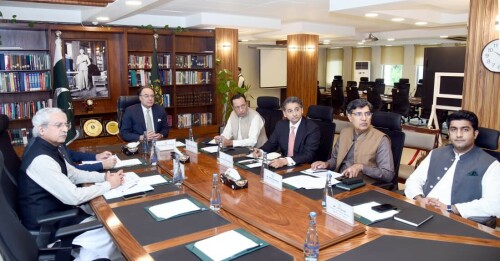Finance Minister Urges Swift Implementation of Social Impact Initiatives
Finance Minister Muhammad Aurangzeb has instructed officials to accelerate the launch of three critical social impact programs in the coming weeks. These initiatives will concentrate on skills enhancement, financing for small-scale farmers, and boosting energy efficiency.
The minister issued these instructions while presiding over meetings on Friday to assess the advancement of significant government projects.
A statement from the Finance Division stated that these projects, each created to produce quantifiable social benefits and further national development goals, are being carried out in close collaboration with pertinent ministries, regulatory organizations, financial institutions, and technical partners.
According to the statement, the Pakistan Skills Impact Bond (PSIB), the nation’s first outcomes-based financing tool with domestic ties, was examined during the first meeting.
This instrument, created under the Social Impact Financing Framework by a Ministry of Finance-led committee established by the Prime Minister, will act as the first in a bigger effort to raise funds from both domestic and foreign private and philanthropic sources.
All social impact funding will be connected to one or more of the Framework’s six key pillars and connected to a number of Sustainable Development Goals (SDGs).
The finance minister emphasized that the PSIB needs to be seen as a pioneering project that not only satisfies urgent development needs but also sets a standard for drawing in a wider and more varied investor base.
The National Subsistence Farmers Support Scheme (NSFSS), a key element of the ECC-approved Access to Finance framework for farmers, was the main topic of the second meeting.
The government anticipates that the NSFSS will make it possible for smallholder farmers, who own or cultivate up to 12.5 acres of land (including tenant farmers), to obtain digitally enabled, uncollateralized bank loans.
The statement continued, “Banks will incorporate agronomy-related satellite data from the Land Information and Management System (LIMS) into their credit scoring models, enabling the provision of loans for agricultural inputs at reasonable mark-up rates, in contrast to the high costs associated with informal lending from middlemen.”
The State Bank of Pakistan is collaborating with banks and the Pakistan Banks’ Association to put the scheme into action using a centralized portal created and maintained by the Punjab Information Technology Board (PITB), guaranteeing a comprehensive digital customer experience.
The finance minister emphasized that this would be the first instance of space technology influencing agricultural credit decisions on a national level and that the project was a turning point for rural finance in Pakistan.
He also emphasized that the scheme is specifically aimed at the segment of the population most in need of reasonably priced credit, given that 97% of farmers own less than 12.5 acres, according to the most recent 7th Agriculture Census, and that it will have a revolutionary impact on rural livelihoods, agricultural productivity, and financial inclusion.
The third meeting, meanwhile, examined the Prime Minister’s Fan Replacement Programme’s progress, which is an energy efficiency project jointly developed by banks and the Power Division’s National Energy Efficiency and Conservation Authority (NEECA).
The program will make it possible for consumers to replace their current ceiling fans with energy-efficient models at reasonable financing rates, with the Ministry of Finance offering a small first-loss guarantee to encourage banks to participate.
A fully digital process—from customer onboarding to loan application, fan selection from approved local manufacturers, and loan disbursement and repayment—will be made possible via an online portal, which PITB also created.
A number of domestic manufacturers of energy-efficient fans have been onboarded and will increase production to meet anticipated demand, which will boost job creation and SME growth.
The Finance Minister emphasized that this project is about more than just replacing fans; it is about incorporating energy efficiency into household choices, lowering the national energy footprint, and opening up new lending opportunities for SMEs.
He emphasized that connecting initiatives like these to SDGs and looking into other sources of funding would increase their social and economic impact while assisting in the development of sustainable local manufacturing capacity.
In conclusion, Aurangzeb said that each project has the potential to act as a model for scaling up, both domestically and abroad, and that effectively implementing them would “signal that Pakistan is ready to innovate, ready to partner, and ready to deliver results that matter for its people.”



Comments (0)
No comments yet. Be the first to comment!
Leave a Comment